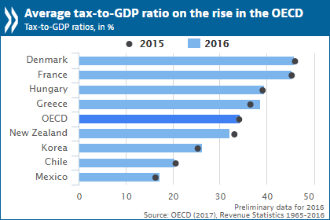Social security contributions and consumption taxes give way to personal income taxes, as corporate income taxes fail to recover
Personal income taxes are playing an increasingly significant role in the tax mix as revenues from social security contributions and consumption taxes fall, and corporate tax collections remain low, according to a new OECD report.

Revenue Statistics 2017 shows that, on average, OECD countries are becoming more reliant on personal income tax (PIT) revenues, with social security contributions (SSCs) and taxes on goods and services declining as a share of total tax revenue. The average share of PIT in total taxation increased from 24.1% in 2014 to 24.4% in 2015, while the respective shares of SSCs and taxes on goods and services (including VAT) fell slightly, according to the report. Corporate income taxes, which fell significantly during the financial crisis, have not recovered, remaining flat at around 8.9% of revenues.
On aggregate, the average tax-to-GDP ratio rose again in 2016, to 34.3%, compared to 34.0% in 2015. Increasing tax-to-GDP levels were seen in 20 of the 33 OECD countries that provided preliminary data in 2016, while tax-to-GDP levels fell in the remaining 13 countries. (Download data in Excel).
In 2016, the highest tax-to-GDP ratios were recorded in Denmark (45.9%), France (45.3%) and Belgium (44.2%) and the lowest in Mexico (17.2%), Chile (20.4%) and Ireland (23.0%). All but 5 countries (Canada, Estonia, Ireland, Luxembourg and Norway) have increased their tax-to-GDP ratio since 2009, the post-financial crisis low-point for tax revenues in the OECD; most of them (18) reaching or exceeding their pre-crisis high point.
This year’s report also confirms three emerging trends in the OECD average tax structure since the global financial crisis: firstly, the share of PIT in total taxes initially fell, from 23.7% in 2007 to a low of 23.2% in 2010, before increasing steadily to 24.4% in 2015; secondly, and by contrast, the share of SSCs and taxes on goods and services initially rose to highs of 26.6% in 2009 and 33.0% in 2010, before decreasing steadily until 2015, to 25.8% and 32.4% respectively; and finally, the share of corporate tax revenues fell during the crisis, from 11.2% in 2007 to a low of 8.8% in 2010, and has since remained relatively stable, at 8.9% in 2015.
In 2016, the largest increases in tax-to-GDP ratios were seen in Greece (2.2 percentage points) and in the Netherlands (1.5 percentage points). The largest decreases were seen in Austria and New Zealand, at one percentage point. On average, the OECD tax-to-GDP ratio is now higher than at any point since 1965, including prior peaks in 2000 and in 2007.
Revenue Statistics contains a special feature on “complementary indicators of tax revenues,” which considers revenues as a proportion of gross national income, per capita, and relative to total revenue and expenditures. It finds that on average, taxes accounted for 82% of total revenues in the OECD in 2015. The share of taxes in total revenues remains lower than prior to the financial crisis, even though the OECD average tax-to-GDP ratio has surpassed pre-crisis levels.
In 2015, the share of subnational tax revenues has remained relatively stable relative to 2014 in both federal and unitary countries. In federal countries, an average of 24.6% of revenues is attributed to subnational governments, with approximately one-third attributed to local governments and the remainder to state governments. In unitary countries, an average of 11.8% of revenues is attributed to local governments. Government-owned social security funds account for 21.1% and 24.4% in federal and unitary countries, respectively.
Source: Organization for Economic Co-operation and Development
- 232 reads
Human Rights
Ringing FOWPAL’s Peace Bell for the World:Nobel Peace Prize Laureates’ Visions and Actions

Protecting the World’s Cultural Diversity for a Sustainable Future

The Peace Bell Resonates at the 27th Eurasian Economic Summit

Declaration of World Day of the Power of Hope Endorsed by People in 158 Nations

Puppet Show I International Friendship Day 2020

